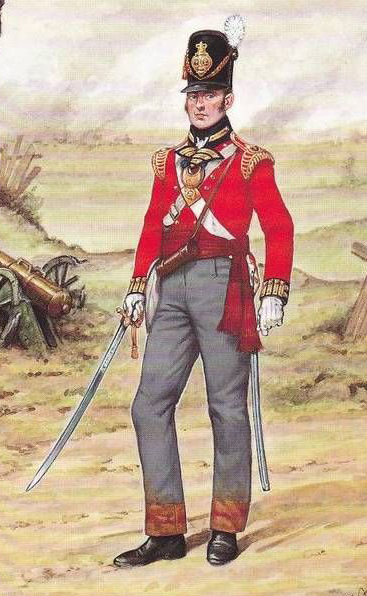 After some noodling on the cultural aspects of the character from the last post, I’ve settled on the following characteristics,,,
After some noodling on the cultural aspects of the character from the last post, I’ve settled on the following characteristics,,,
Émigré: Hanoverian Germans, American Loyalists and other exiles from countries allied against the UK, who are serving in the British army. Gain Advantage when fighting against their kinsmen who side against the British, and when scouting, spying, or navigating within their homeland. Allied forces will also gain Advantage in marching and counter-marching within the Émigré’s home territory, so long as they are with them and actively advising.
Welsh: The Welsh gain Advantage on any rolls involving singing, statesmanship and seduction.
Irish: The ‘Luck of the Irish’ gives the starting Irish character +1 Luck. They suffer Disadvantage, however, whenever dealing socially with the English and Welsh, or when rolling to maintain order and discipline on the battlefield.
Scottish: Scotsmen gain Advantage on any roll to maintain battlefield discipline and order. Conversely, the fearsome reputation of the Highland warriors imposes a Disadvantage to the same on any battlefield enemy against which they march or charge. They are very thrifty, however, and suffer Disadvantage when making Wealth rolls, as their frugal temperament will often work against them when spending money, especially with those who refuse to haggle.
As you can see, not all of the cultures are equally disadvantaged. There is, for example, no disadvantage to being an Émigré or Welsh, and the Scottish are at less of a disadvantage than the Irish. One commentator mentioned to me that the Welsh are essentially the ‘elves’ of this game (which I find appropriate considering Tolkien’s love of the Welsh language and culture), but without level caps, like OD&D.
This is intentional and represents the under-representation of those ‘races’ on our chart (the chance of being welsh is only 4%, for example). This was not an uncommon method for ‘balancing’ results back in the day, and much preferable (IMO) to allowing direct choice of race and then ‘hobbling’ the character in some other way.
TO THE MANOR BORN…
The next part of our character design process concerns three things very important to Georgian society: class, titles and wealth.
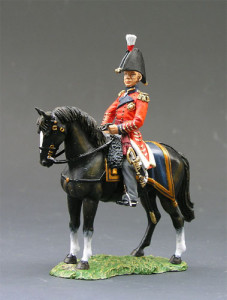 This is also very important for our RPG, for it is what sets it apart from the standard wargame and makes it something special. We might know that our miniature officer in a table-top wargame of Napoleonics is almost certainly a wealthy noble due to the expense of purchasing a commission in the British Army, but the rules don’t really encourage us, mechanically, to explore his background in any way. He is just one more piece on the battlefield.
This is also very important for our RPG, for it is what sets it apart from the standard wargame and makes it something special. We might know that our miniature officer in a table-top wargame of Napoleonics is almost certainly a wealthy noble due to the expense of purchasing a commission in the British Army, but the rules don’t really encourage us, mechanically, to explore his background in any way. He is just one more piece on the battlefield.
One might go as far as to name him, come up with an imaginary personality for him and even record his exploits, if he is particularly lucky or involved in memorable engagements during a campaign (as the famous author Robert Louis Stevenson was wont to do), but it is all a simple personal fiction, made up as the player wishes, with no real interactive/game structure or balance. Our miniature officer could be royalty, have come up from the ranks for some imagined past act of bravery or have the assistance of a lucky faerie companion, if the player so chooses to describe it that way. But whatever the description, it is all made up after the fact and doesn’t change the actual rules of the game one whit.
In an RPG, however, such things are of great import to playing the character and the rules reflect it. The child of a Peer will be a very different character from that of the street urchin who joined the ranks to escape crushing poverty, for example. He will have a mechanical advantage in situations of society and wealth, but is unlikely to possess the toughness and roguish skills of his streetwise counterpart.
The following rules present a bit more complexity than that used to create characters in OD&D, but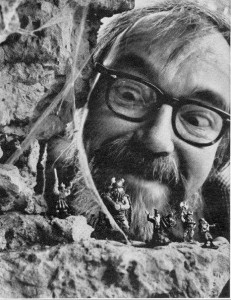 I think that this is one of those areas of design in which Luther, a literature professor, would differ from Gygax, whose game was essentially, at it’s heart, still very much a wargame in the traditional sense. OD&D characters were given attributes, a career class (which often served as their name as well) and some equipment, but rarely a backstory in those early days. They were characters in the sense that they were named individuals, but they still remained largely playing pieces (albeit, ones with much more agency) and the player was more like the Greek gods of old, guiding their mortal pawn and watching them live or dice by the throw of the cosmic dice, than actors playing a role.
I think that this is one of those areas of design in which Luther, a literature professor, would differ from Gygax, whose game was essentially, at it’s heart, still very much a wargame in the traditional sense. OD&D characters were given attributes, a career class (which often served as their name as well) and some equipment, but rarely a backstory in those early days. They were characters in the sense that they were named individuals, but they still remained largely playing pieces (albeit, ones with much more agency) and the player was more like the Greek gods of old, guiding their mortal pawn and watching them live or dice by the throw of the cosmic dice, than actors playing a role.
In stark contrast, I think Luther would have created a more narrative style of gaming right out of the gate, something that would have drawn from the SCA tradition of playing the character in a more dramatic, immersive sense, with primitive systems to support such play. And that would start with Step 3 in the character creation process…
3. ROLL STANDINGS
There are three Standings in Donjons & Dragoons: Class, in the social hierarchy sense; Titles, which are specific, awarded ranks within that hierarchy; and Wealth, an abstract measure of your purchasing power.
CLASS
Determining your birth class is a two step process, determining your overall societal rank followed by your position in that rank. This is important because it not only gives you a starting Wealth rating, and a starting Trade, but also because it give you a greater sense of the what kind of life your character lived before taking up their current adventures (something that will be elaborated on in the rulebook).
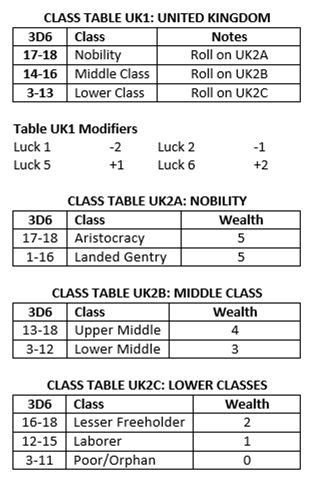 Aristocracy: Your character’s father is, or was, a Peer or the child of a Peer, possibly of royal blood. They may inherit a title upon his death, assuming they are the eldest surviving son (see TITLES, below).
Aristocracy: Your character’s father is, or was, a Peer or the child of a Peer, possibly of royal blood. They may inherit a title upon his death, assuming they are the eldest surviving son (see TITLES, below).
Take ONE of the following Trades at a rank equal to the character’s starting Charisma: Aristocrat, Sailor, or Soldier.
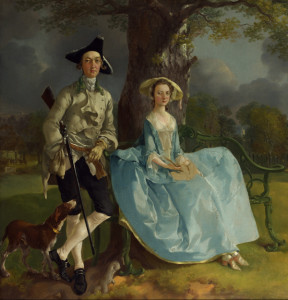 Landed Gentry: The character’s father is, or was, a member of the lesser nobility (a Baronet or Knight) or a wealthy landowner of means. They will receive no hereditary title from him, but may inherit his lands and wealth.
Landed Gentry: The character’s father is, or was, a member of the lesser nobility (a Baronet or Knight) or a wealthy landowner of means. They will receive no hereditary title from him, but may inherit his lands and wealth.
Take ONE of the following Trades at a rank equal to the character’s starting Savvy: Landlord, Sailor, Soldier.
Upper Middle: The character comes from well to do parents who have provided them with a top notch education that can lead into a variety of professions.
Take ONE of the following Trades at a rank equal to the character’s starting Savvy: Academic (Professor), Banker, Clergy, Doctor, Lawyer, Merchant, Sailor, Soldier or Statesman.
Lower Middle: The character’s parents owned a thriving business of respectable size that required long hours to support, but also provided a comfortable living and, possibly. a decent education for their offspring.
Take ONE of the following Trades at a rank equal to the character’s starting Savvy: Academic (Teacher), Clergy, Entertainer, Landlord, Lawyer, Merchant, Sailor, Soldier or Statesman.
Lesser Freeholder: The character’s parents owned an inn, shop, public house, farmstead or other small, common business, which everyone in the family labored at constantly to support. There weren’t much in creature comforts, but it made a stable living.
Take ONE of the following Trades at a rank equal to the character’s starting Vigor: Clergy, Craftsman, Entertainer, Healer, Laborer, Merchant, Sailor or Soldier.
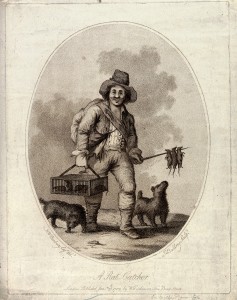 Laborer: The character is a common laborer or craftsman, working for an established business owner, working as a servant, or travelling from odd job to odd job.
Laborer: The character is a common laborer or craftsman, working for an established business owner, working as a servant, or travelling from odd job to odd job.
Take ONE of the following Trades at a rank equal to the character’s starting Vigor: Craftsman, Entertainer, Healer, Hunter, Laborer, Rogue, Sailor or Soldier.
Poor/Orphan: The character was born extremely poor, living a meager existence on the streets helping to support their family, orphaned and forced to grow up in a work-house, or as part of a criminal gang. Some young children are scooped up by the military at an early age to serve as drummer boys, ship’s boys and powder monkeys.
Take ONE of the following Trades at a rank equal to the character’s starting Vigor: Entertainer, Hunter, Laborer, Rogue, Soldier, or Sailor.
TITLE
If your character is male and has a father with the title of Baron or greater, he may inherit his father’s title and the lands. It all depends on his Birth Order and his Father’s (and possibly Grandfather’s) Status.
Birth Order: Roll a D6 to determine how many male children are in the family. Then roll a second D6 and subtract it from the first. If the total is 1 or less, the character is the eldest son. Otherwise, the result will determine their actual place.
Father’s Status: Roll on Table UK3A: Peerage, to determine your father’s rank.
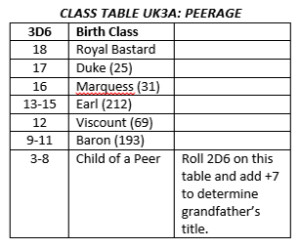 Next, roll a D6. If the result is 1 or 2, the character’s father has passed and the eldest son inherits his title and full Wealth rating.
Next, roll a D6. If the result is 1 or 2, the character’s father has passed and the eldest son inherits his title and full Wealth rating.
Grandfather’s Status: If the character’s father is the son of a Peer, then his grandfather holds the title and his father is in line for it. If this is the case, determine the grandfather’s title (as above) and then the father’s birth order (as above) to determine his place in the line of succession.
Female Titles: If your character is a female member of a noble family, her title is dependent on the title of her husband, if she is married.
Roll 2D6 and add the ladies Charisma rating. On a result of 12 or more, she is already married and should roll on the Marriage Class table below to determine her husband’s Title (and hers, if any), as well as her starting Wealth (which replaces that of her Birth)
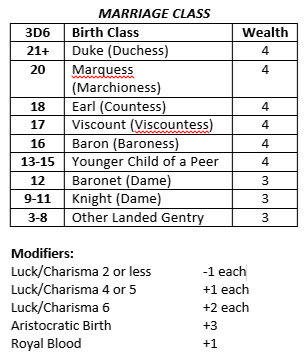 A Note on Female Characters
A Note on Female Characters
Now, one of the things that had occurred to me when trying to imagine the impact of this game replacing OD&D in the history of RPGs is the place of women in the growth of the hobby. The fantasy milieu of that game was certainly more friendly to women characters than the historical Georgian era. Would Lee 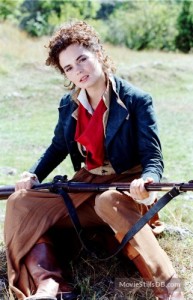 Gold, for example, have become such an avid role-player if her character was so restricted as indicated by the rules above? More importantly, would Luther have considered the place of women in gaming as he wrote the rules?
Gold, for example, have become such an avid role-player if her character was so restricted as indicated by the rules above? More importantly, would Luther have considered the place of women in gaming as he wrote the rules?
I’m going to have to do more research on the subject to definitively answer this, but my experience and gut instinct tell me that there would be some allowance made for female adventurers in such a setting. After all, outside of the obvious female partisans and assorted spies and provocateurs, there were also ‘wild women’ of the aristocracy who did precisely what they wanted, when they wanted to.
But aside from that, I think that there is wide scope for stories told outside of the war, in the style of Jane Austen and Tolstoy, where the war is a backdrop to courtly maneuvers and high society shenanigans. This would be addressed in a later supplement, Airs & Aristocracy, and include rules for running a game where the action switches from the war, to the halls and drawing rooms of power, and back again, with players running different characters in both areas whose actions can affect each other, as in War & Peace. Considering his love for Tolstoy, I think this form of troupe play would be very much on Luther’s mind as designed the game.
WEALTH
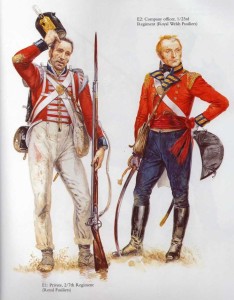 Luther being a professor of literature, not accounting, would have absolutely 0 interest in keeping track of money down to the farthing. In most literature, wealth is depicted less in terms of actual coinage and more in terms of description. You know, for example, that a character is rich by the many frills on their uniform, the quality of their horse, the silver filigree on their fancy, rifled pistols and the fact that they have servants waiting on them hand and foot. Likewise, a character with a shabby, patched uniform, dung on his boots and an outdated blunderbuss is clearly a peasant with nowt to his name.
Luther being a professor of literature, not accounting, would have absolutely 0 interest in keeping track of money down to the farthing. In most literature, wealth is depicted less in terms of actual coinage and more in terms of description. You know, for example, that a character is rich by the many frills on their uniform, the quality of their horse, the silver filigree on their fancy, rifled pistols and the fact that they have servants waiting on them hand and foot. Likewise, a character with a shabby, patched uniform, dung on his boots and an outdated blunderbuss is clearly a peasant with nowt to his name.
Wealth in Donjons & Dragoons, then, will be based on a rating, just like an attribute, and represents raw purchasing power. A 0 represents no source of income, with only a few farthings to one’s name, while 6 represents massive land holdings and investments that are rarely found outside the coffers of a King.
Our class (or marriage class, in the case of noble women) provided us with a base Wealth Rating. This is now modified by a roll of 2D6 on the chart below:
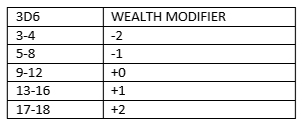 A negative modifier might represent family debts, poor management, or reckless spending that has reduced the character’s income below the normal level. A positive modifier might represent hard earned savings, or a sudden influx of wealth from battlefield plunder, political appointment, etc., so even a common Private in the army might have a tidy sum socked away in the hem of his clothes if he gets lucky (like many of those at Vitoria, where soldiers ‘liberated’ the modern equivalent of $128m from the French baggage train). Whether he can keep it is another thing, entirely…
A negative modifier might represent family debts, poor management, or reckless spending that has reduced the character’s income below the normal level. A positive modifier might represent hard earned savings, or a sudden influx of wealth from battlefield plunder, political appointment, etc., so even a common Private in the army might have a tidy sum socked away in the hem of his clothes if he gets lucky (like many of those at Vitoria, where soldiers ‘liberated’ the modern equivalent of $128m from the French baggage train). Whether he can keep it is another thing, entirely…
MANNERS MAKETH MAN
So at this point, one should have a fairly good idea of where their character comes from and under what circumstances they live their life. From these seeds, the rulebook will encourage them to flesh out the history of their character. As we will see later in character generation and combat, characters have a much greater life expectancy in this game than OD&D (through a form of narrative immunity/plot armor), so such detail, which would seem extravagant for a character who might fall into a pit and die a few minutes after entering their first dungeon, is well worth the effort in Donjons & Dragoons.
Next up, we will discuss Trades, Qualities and assigning characters a Rank and Unit…

